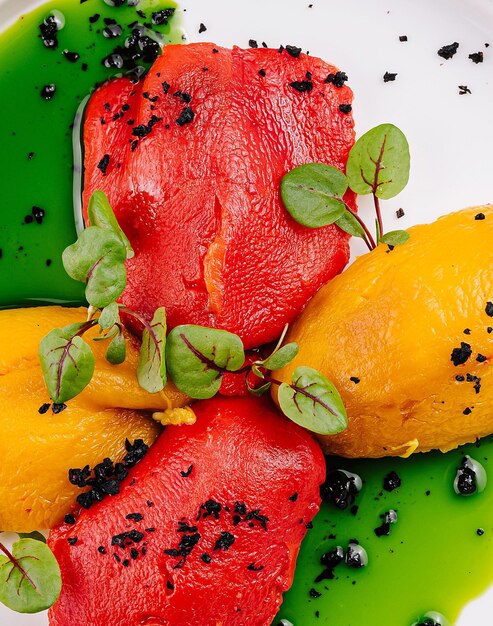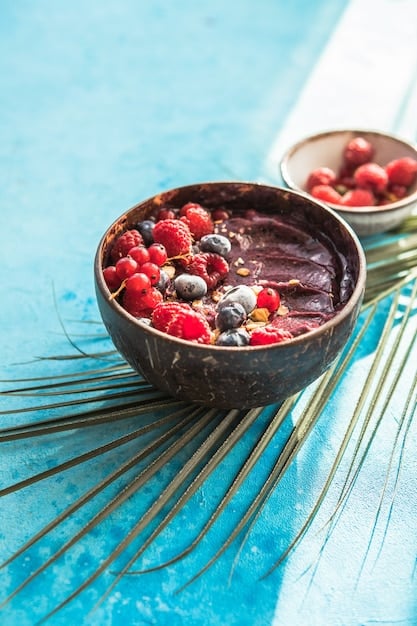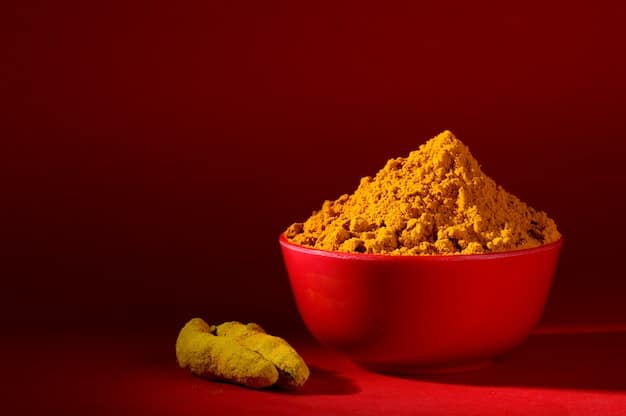Boost Immunity: 7 Foods for Winter Health

Strengthening your immune system during winter is crucial, and certain foods can significantly contribute to this defense, providing essential nutrients that support robust health and resilience against seasonal challenges.
As winter approaches, our bodies often seek extra support to ward off seasonal ailments. A strategic approach to diet, focusing on nutrient-dense foods, can significantly bolster your natural defenses. This guide explores how to achieve an Immunity Boost: 7 Foods to Strengthen Your Immune System This Winter, offering practical ways to nourish your body and maintain well-being.
Understanding Your Immune System During Winter
The immune system is a complex network of cells, tissues, and organs that work together to defend the body against harmful invaders. During winter, environmental factors like colder temperatures, lower humidity, and increased indoor gatherings can create an environment conducive to the spread of viruses, making a robust immune response even more critical.
Our bodies face unique challenges when temperatures drop. Shorter days mean less sunlight exposure, which can lead to reduced vitamin D levels, a vital nutrient for immune function. Additionally, the air often becomes drier, potentially compromising the protective mucous membranes in our respiratory tracts. Understanding these challenges is the first step toward building a stronger defense.
Seasonal Challenges and Immune Response
The change in seasons impacts our physiological state. For instance, cold air may constrict blood vessels in the upper respiratory tract, potentially reducing the delivery of immune cells to areas where pathogens might enter. It’s a subtle but significant shift that our bodies must adapt to, and nutrition plays a huge role in supporting this adaptation.
- Reduced Vitamin D: Less sunlight means lower natural production.
- Dry Air: Can irritate mucous membranes, making them more vulnerable.
- Increased Indoor Exposure: More time indoors facilitates germ transmission.
The immune system’s primary goal is to recognize and neutralize threats. This involves a coordinated effort from various components, including white blood cells like lymphocytes and phagocytes, antibodies, and even the natural barriers of our skin and mucous membranes. A compromised immune system can lead to more frequent and severe infections.
Beyond external factors, stress, lack of sleep, and insufficient physical activity can also weaken immunity. Winter often brings additional stressors, such as holiday preparations or seasonal affective disorder, further underscoring the importance of a holistic approach to immune health. Diet, however, remains one of the most accessible and impactful avenues for support.
Citrus Fruits: A Burst of Vitamin C
When we think of immune-boosting foods, citrus fruits often come to mind, and for good reason. Oranges, grapefruits, lemons, and limes are powerhouses of vitamin C, an essential micronutrient known for its critical role in stimulating the production and function of white blood cells. These cells are the front-line soldiers of your immune system, identifying and destroying pathogens.
Beyond its direct impact on white blood cells, vitamin C also acts as a potent antioxidant. Antioxidants help protect cells from damage caused by free radicals, byproducts of natural bodily processes and environmental stressors. This cellular protection is vital for overall health and the efficient functioning of the immune system.
How Vitamin C Supports Immunity
Vitamin C contributes to immune defense by supporting various cellular functions of both the innate and adaptive immune systems. It enhances phagocyte activity, which are cells that engulf and digest foreign particles. It also plays a role in lymphocyte proliferation, the multiplication of immune cells that specifically target infections.
- Enhances white blood cell production: Vital for fighting infections.
- Acts as an antioxidant: Protects cells from oxidative stress.
- Supports skin barrier function: Helps maintain the integrity of physical barriers against pathogens.
Regular intake of vitamin C can help shorten the duration and alleviate the severity of colds and other infections. While oranges are a popular choice, don’t overlook other sources like tangerines, clementines, and even exotic options like kumquats, all of which offer a diverse range of beneficial compounds alongside their vitamin C content.
Incorporating citrus into your daily diet is simple. Add a squeeze of lemon to your water, enjoy grapefruit halves for breakfast, or toss orange segments into salads. These small additions can significantly contribute to your daily vitamin C needs, providing a natural and delicious way to strengthen your immune defenses throughout the colder months.

Berries: Antioxidant Powerhouses
Berries, including blueberries, strawberries, raspberries, and blackberries, are more than just delicious; they are packed with antioxidants, particularly anthocyanins, which give them their rich, dark colors. These compounds play a vital role in protecting the body’s cells from oxidative stress, a process that can weaken the immune system and increase susceptibility to illness.
Beyond their antioxidant properties, berries are also good sources of various vitamins and minerals, including vitamin C and fiber. Fiber promotes a healthy gut microbiome, which is intrinsically linked to immune health. A balanced gut flora can influence the production of immune cells and modulate inflammatory responses.
Key Antioxidants in Berries
The high concentration of polyphenols in berries, especially flavonoids like anthocyanins and ellagic acid, contributes to their immune-boosting capabilities. These compounds help to neutralize free radicals, reducing cellular damage and supporting overall cellular integrity, which is essential for a robust immune response.
- Anthocyanins: Provide potent antioxidant and anti-inflammatory effects.
- Flavonoids: Support overall immune function and cellular health.
- Ellagic Acid: Another powerful antioxidant found abundantly in berries.
Studies suggest that regularly consuming berries may help reduce inflammation throughout the body, a common underlying factor in many chronic diseases and a component of a weakened immune system. By mitigating inflammation, berries can help direct the immune system’s resources more efficiently toward fighting off genuine threats.
Whether fresh or frozen, berries retain much of their nutritional value, making them a convenient option year-round. Add them to your morning oatmeal, blend them into smoothies, or enjoy them as a simple, healthy snack. Their versatility makes it easy to integrate these immune-supportive fruits into any diet during winter.
Leafy Greens: Nutrients for Resilience
When it comes to boosting immunity, leafy green vegetables like spinach, kale, and Swiss chard are unsung heroes. These vibrant greens are packed with vitamins A, C, and K, as well as folate, iron, and a host of antioxidants. Each of these nutrients plays a specific, yet interconnected, role in maintaining a strong immune system.
Vitamin A, for example, is crucial for maintaining the integrity of mucosal surfaces in the respiratory, gastrointestinal, and urinary tracts, which act as the body’s first line of defense against pathogens. Vitamin C, as discussed, supports white blood cell function, while vitamin K is essential for blood clotting and bone health, indirectly supporting overall vitality.
The Power of Chlorophyll and Folate
Leafy greens are rich in chlorophyll, the pigment that gives them their green color. While not directly an immune booster, chlorophyll has detoxifying properties that can support liver function, which in turn helps the body process and eliminate toxins that might otherwise strain the immune system. Folate, or vitamin B9, supports cell division and the production of new cells, including immune cells.
- Vitamin A: Maintains mucosal barriers and supports immune cell differentiation.
- Vitamin C: Enhances white blood cell activity and acts as an antioxidant.
- Folate: Essential for DNA synthesis and immune cell production.
Beyond these specific nutrients, leafy greens contribute significantly to the body’s overall nutritional status, providing a broad spectrum of micronutrients that work synergistically. A diet rich in variety ensures that the immune system has all the building blocks it needs to operate at peak efficiency.
Integrating more leafy greens into your diet can be as simple as adding a handful of spinach to your eggs, blending kale into a smoothie, or using collard greens as a wrap. Their mild flavors make them adaptable to many dishes, ensuring you can nourish your immune system deliciously throughout the winter.
Garlic and Ginger: Ancient Immune Remedies
For centuries, garlic and ginger have been celebrated in traditional medicine for their potent health benefits, particularly their role in supporting the immune system. Both are renowned for their anti-inflammatory and antiviral properties, making them indispensable allies during the cold and flu season.
Garlic contains compounds like allicin, which is responsible for its distinctive pungent aroma and many of its medicinal properties. Allicin has been shown to have antimicrobial effects, helping to fight off bacteria, viruses, and fungi. Regular consumption of garlic may reduce the frequency and severity of common colds.
The Mechanisms Behind Their Power
Ginger, on the other hand, is rich in gingerol, a bioactive compound with powerful anti-inflammatory and antioxidant effects. It can help alleviate symptoms of respiratory infections and soothe an upset stomach, often associated with illnesses. Both garlic and ginger can help stimulate the body’s immune response.
- Garlic (Allicin): Possesses antimicrobial and immune-modulating effects.
- Ginger (Gingerol): Offers anti-inflammatory and antioxidant benefits.
- Synergistic Effects: Used together, they can enhance each other’s benefits.
While often used as flavor enhancers in cooking, their medicinal properties are best harnessed when consumed regularly. Fresh garlic is more potent, and ginger can be brewed into a tea or added to stir-fries and soups. Their strong flavors can also make dishes more appealing, encouraging greater intake of nutrient-rich meals.
Incorporating garlic and ginger into your daily diet is an enjoyable and effective way to fortify your immune system. Whether minced into a dressing, stir-fried with vegetables, or steeped in a comforting tea, these ancient remedies continue to prove their worth in modern immune support strategies.

Turmeric: The Golden Spice of Immunity
Turmeric, often referred to as “the golden spice,” has garnered significant attention for its remarkable health benefits, particularly its role as an immune booster. Its primary active compound, curcumin, is a potent anti-inflammatory and antioxidant agent, distinguishing turmeric as more than just a culinary ingredient.
Inflammation, while a natural part of the immune response, can become detrimental if chronic. Curcumin helps to modulate this response, ensuring that inflammation serves its protective purpose without causing undue harm to the body’s tissues. This balance is crucial for maintaining a healthy and efficient immune system, especially during winter when inflammatory responses can be heightened due to infections.
Curcumin’s Impact on Immune Cells
Curcumin doesn’t just reduce inflammation; it also directly impacts various immune cells. It can enhance the activity of natural killer (NK) cells, which are crucial for early responses to viral infections. It also influences T-cells and B-cells, key players in the adaptive immune system that provide long-lasting immunity.
- Anti-inflammatory: Modulates inflammatory pathways to prevent chronic inflammation.
- Antioxidant: Protects cells from damage, supporting cellular integrity.
- Immune Cell Modulation: Enhances the function of various immune cells.
To maximize curcumin absorption, it’s often recommended to consume turmeric with black pepper, which contains piperine. Piperine significantly enhances curcumin’s bioavailability, allowing the body to utilize its benefits more effectively. This synergy makes turmeric and black pepper a powerful duo for immune support.
Adding turmeric to your diet is easy. It can be incorporated into curries, soups, scrambled eggs, or even warm milk for a comforting “golden milk” latte. Its earthy flavor complements a wide range of dishes, making it an accessible and enjoyable addition to your winter wellness routine.
Yogurt and Fermented Foods: Gut Health, Immune Power
The notion that “all disease begins in the gut” is gaining increasing scientific validation, especially concerning immune health. Our gut microbiome, a vast community of trillions of microorganisms, plays a profound role in educating and regulating our immune system. Yogurt and other fermented foods are excellent sources of probiotics, beneficial bacteria that support a healthy gut flora.
A balanced gut microbiome can influence the production of various immune cells and antibodies, enhance the integrity of the gut lining (which acts as a barrier against pathogens), and modulate inflammatory responses. When the gut is thriving, the immune system is better equipped to recognize and fight off invaders.
Probiotics and Their Role
Probiotics, found in foods like yogurt, kefir, sauerkraut, kimchi, and tempeh, introduce beneficial bacteria to the gut. These bacteria compete with harmful pathogens, produce helpful metabolites (like short-chain fatty acids), and directly interact with immune cells in the gut-associated lymphoid tissue (GALT), one of the largest immune organs in the body.
- Enhance Gut Microbiome: Introduce beneficial bacteria.
- Strengthen Gut Barrier: Reduce permeability and prevent pathogen entry.
- Modulate Immune Response: Influence immune cell development and function.
When selecting yogurt, opt for varieties that contain “live and active cultures” and are low in added sugars. Plain yogurt can be customized with fruits, nuts, or seeds for added nutrients. Incorporating a variety of fermented foods into your diet provides a diverse range of beneficial strains, further enhancing their positive impact on gut and immune health.
Beyond yogurt, explore other fermented foods to diversify your probiotic intake. Sauerkraut and kimchi can be added as condiments, while kefir can be enjoyed as a beverage. Nurturing your gut health with these foods is a sophisticated strategy for building robust immunity from within, proving that what’s good for your gut is often good for your entire body.
Nuts and Seeds: Essential Minerals for Defense
Often overlooked in the discussion of immune-boosting foods, nuts and seeds are miniature powerhouses of essential minerals that play critical roles in immune function. Zinc, selenium, and vitamin E, all abundantly found in various nuts and seeds, are vital for the proper development and activity of immune cells.
Zinc, for example, is indispensable for the normal development and function of immune cells. Even a mild deficiency can impair immune responses, making the body more vulnerable to infections. Selenium acts as a powerful antioxidant and is crucial for the optimal functioning of certain enzymes involved in immune defense.
Zinc, Selenium, and Vitamin E Synergy
Vitamin E, predominantly found in seeds like sunflower seeds and almonds, is another robust antioxidant that protects cell membranes from oxidative damage. This protection is vital for maintaining the integrity of immune cells, allowing them to function effectively in fighting off pathogens.
- Zinc: Crucial for immune cell development and function.
- Selenium: Potent antioxidant, essential for immune response.
- Vitamin E: Protects immune cells from oxidative damage.
Brazil nuts are particularly rich in selenium, while pumpkin seeds, cashews, and almonds are excellent sources of zinc. Sunflower seeds and almonds also stand out for their vitamin E content. A diverse intake of nuts and seeds ensures a broad spectrum of minerals and vitamins that work synergistically to bolster your immune system.
Incorporating nuts and seeds into your daily diet is simple and versatile. Sprinkle them over oatmeal, add them to salads for a crunchy texture, blend them into smoothies, or simply enjoy them as a satisfying snack. Their nutrient density makes them an efficient way to provide your body with the essential micronutrients it needs to stay resilient throughout the winter.
| Key Food Group | Immune Benefit |
|---|---|
| 🍊 Citrus Fruits | Rich in Vitamin C, boosting white blood cell function. |
| 🍓 Berries | Packed with antioxidants like anthocyanins to protect cells. |
| 🍃 Leafy Greens | Provide Vitamins A, C, K, and folate for overall immune health. |
| 🧄 Garlic & Ginger | Contain compounds with anti-inflammatory and antiviral properties. |
Frequently Asked Questions About Immunity and Winter Foods
▼
Winter presents several challenges including reduced sunlight exposure, leading to lower Vitamin D levels, and drier indoor air that can irritate respiratory passages. Additionally, increased indoor gatherings facilitate the spread of viruses, making a robust immune response crucial for staying healthy during the colder months.
▼
Vitamin C is vital for stimulating the production and function of white blood cells, which are the immune system’s primary defenders against pathogens. It also acts as a powerful antioxidant, protecting cells from oxidative stress and supporting the integrity of physical barriers like skin, crucial for overall immune defense.
▼
Yes, frozen berries largely retain their nutritional value and antioxidant content, similar to fresh ones. Flash-freezing helps preserve their vitamins and beneficial compounds, making them a convenient and equally effective choice for boosting your immune system year-round, regardless of seasonal availability.
▼
The gut microbiome plays a profound role in immunity, influencing the development and regulation of immune cells and antibodies. A balanced gut flora strengthens the gut lining, acting as a barrier against pathogens, and modulates inflammatory responses, leading to a more efficient and effective immune system.
▼
While a diet rich in immune-boosting foods is highly beneficial, the necessity of supplements depends on individual needs, existing deficiencies, and dietary restrictions. It’s always best to consult with a healthcare professional to determine if supplementation is appropriate for your specific health goals, ensuring a personalized approach to immunity.
Conclusion
Navigating the winter months with a robust immune system is entirely achievable by making conscious dietary choices. The seven food groups discussed—citrus fruits, berries, leafy greens, garlic, ginger, turmeric, yogurt, fermented foods, and nuts and seeds—collectively offer a powerful arsenal of vitamins, minerals, and antioxidants essential for strengthening your body’s natural defenses. By consciously incorporating these nutrient-dense options into your daily meals, you not only enhance your immunity but also foster overall well-being, paving the way for a healthier and more resilient winter season.





